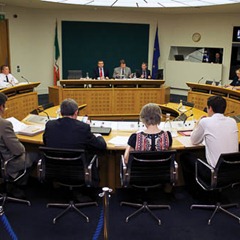Banking Inquiry to examine causes of crisis
 eolas considers the remit and powers of the Oireachtas Banking Inquiry as it prepares to scrutinise the relationship between the Government, banks and the property sector before the crash.
eolas considers the remit and powers of the Oireachtas Banking Inquiry as it prepares to scrutinise the relationship between the Government, banks and the property sector before the crash.
Formally established last November, the Committee of Inquiry into the Banking Crisis is currently completing the context phase of its investigation into the economy’s near-collapse. This essentially involves technical briefings to give members a detailed understanding of the background to the crisis.
That work was completed in March and the inquiry has now moved on to the ‘nexus’ phase i.e. an examination of how the Government, the banks and the property sector interacted at the time. Three broad elements will be examined:
1. banking systems and practices;
2. regulatory and supervisory systems and practices; and
3. crisis management systems and policy responses.
The committee is required to report back to the Oireachtas no later than
30 November this year.
Understandably, the Banking Inquiry is the most complex probe to be undertaken by the Oireachtas. It is, in the first instance, being advised by UCD Professor of Economics Karl Whelan and global consultancy FTI. The firm has been operating since 1982 and is headquartered in Washington DC. Its recent investigations have covered the bankruptcies of Lehman Brothers and General Motors, and the Bernard Madoff fraud.
The experts who will advise the inquiry during the nexus phase have backgrounds in financial investigations and reviews. Peter Murray was involved in Nama’s large complex debtor cases. Helen Bunbury was most recently Group Chief Operating Officer for Ogier, a major international law firm operating in tax haven jurisdictions and the Asia-Pacific region. Pat McLoughlin has led the Chief Executive of the Irish Payment Services Organisation and has a background in Health Service management.
As a first step, the committee requested documentation from the major banks, the Department of Finance, and the Department of the Taoiseach. Initial responses were received in early January.
The limits to the committee’s ability to call persons or papers became a difficulty when former ECB President Jean-Claude Trichet stated that – based on legal advice – he was not obliged to appear before a committee of a national parliament. Trichet instead sought to change the format of the inquiry by offering to be questioned by Irish MEPs in Brussels or a third party in Dublin. Questioning of Trichet would naturally focus on the tone and content of the leaked ECB letters to Brian Lenihan (19 November 2010) which demanded widespread policy changes from an elected government two days before the bail-out was announced. The commentary about a bail-out in the weeks beforehand has led to speculation that more correspondence took place.
The Central Bank (Amendment) Bill, when enacted, will allow access to confidential documents held at Dame Street. In contrast to the dealings with the ECB, Ciarán Lynch has described the committee’s engagement with the Central Bank as “highly co-operative and constructive.”
The Houses of the Oireachtas (Inquiries, Privileges and Procedures) Act 2013 allows findings of fact to “directly impugn” a person’s good name where evidence is being recorded and reported and where committee members are examining the removal, proposed removal and/or conduct of office-holders. The Act also provides for qualified privilege for the private papers of members, official documents of the Oireachtas, and confidential communications from whistle-blowers to TDs and senators.
The inquiry has so far heard evidence from domestic and European economists and has also considered two of the major “what if” situations where different choices could have steered the economy on to another path.
Ireland, for example, could have followed the example of the UK and Denmark and opted out of the euro. Trinity College Dublin economist Philip Lane suggested that, if the State had continued with its own currency, the crisis would have been more acute crisis but could have been followed by a faster recovery due to national discretion in making policy. Lane described the euro system as an “important buffer” as the Central Bank’s ability to provide foreign currency liability would otherwise have been limited and risks of capital flight and large scale devaluation would have been higher.
The second “what if” arises around the 2008 bank guarantee, described by Gregory Connor (NUI Maynooth) as “a very costly error”. The lender of last resort – the ECB – was “not working properly” and, in his view, the advice provided by Central Bank to the Government was “very poor” while some of the banks’ returns to the Central Bank “may have been deliberately embellished”. His claims will be explored by the inquiry’s members over the coming months as they review the key story in our recent economic past.
Broad responsibility
Outlining his 2001 report’s findings, Finnish economist
Peter Nyberg observed that responsibility for the crisis “must be very widely allocated and any investigation should thus be wide-ranging”. He added: “Assigning blame primarily to lenders tends to ignore the fact that a bad loan also implies that the borrower’s risk assessment turned out to be wrong.”
Limits of regulation
“No regulatory system can or even should attempt to eliminate all possibility of failure,”
Patrick Holohan commented. The Central Bank Governor added that regulation and supervision must be able to change with a “constantly changing” financial industry. Holohan sees the more assertive current system as striking the right balance.
Lack of oversight
“Weak financial supervision and bank governance combined with official policies to leave the economy vulnerable to a deep crisis,” European Stability Mechanism Managing Director Klaus Regling stated. The true burden of responsibility was “quite broad” and “it seems no-one was really in charge to prevent such a bubble from emerging over the previous four to five years.”
White collar crime
William Black is a white collar criminologist at the University of Missouri-Kansas City. “There is nothing a nation does in the domestic sphere that is more expensive than ineffective regulation,” he stated. Bank regulators need to “act vigorously and promptly” to stop the growth of toxic loans as well as “indefensible” loan underwriting and deceptive selling.
New EU policy tools
Mario Nava, the policy lead on financial supervision for the European Commission, outlined the impact of the EU’s banking reforms the 2006 Capital Requirements Directive to the ECB taking on responsibility to supervise the euro zone’s 120 largest banking groups. If properly enforced, Nava expects the reforms to provide “a more robust set of tools, making future crises less likely and, if nevertheless they were to happen, less costly.”
Better understanding
As Director-General for Economic and Financial Affairs, Marco Buti has overseen the European Commission’s response to the crisis since 2008. Reflecting on its causes, he notes that even if the Commission could have anticipated the end of the boom, it would have had no legal tools to ask Ireland to correct the problems involved. The main constraint, was its “limited understanding of what can really endanger macroeconomic stability”.





